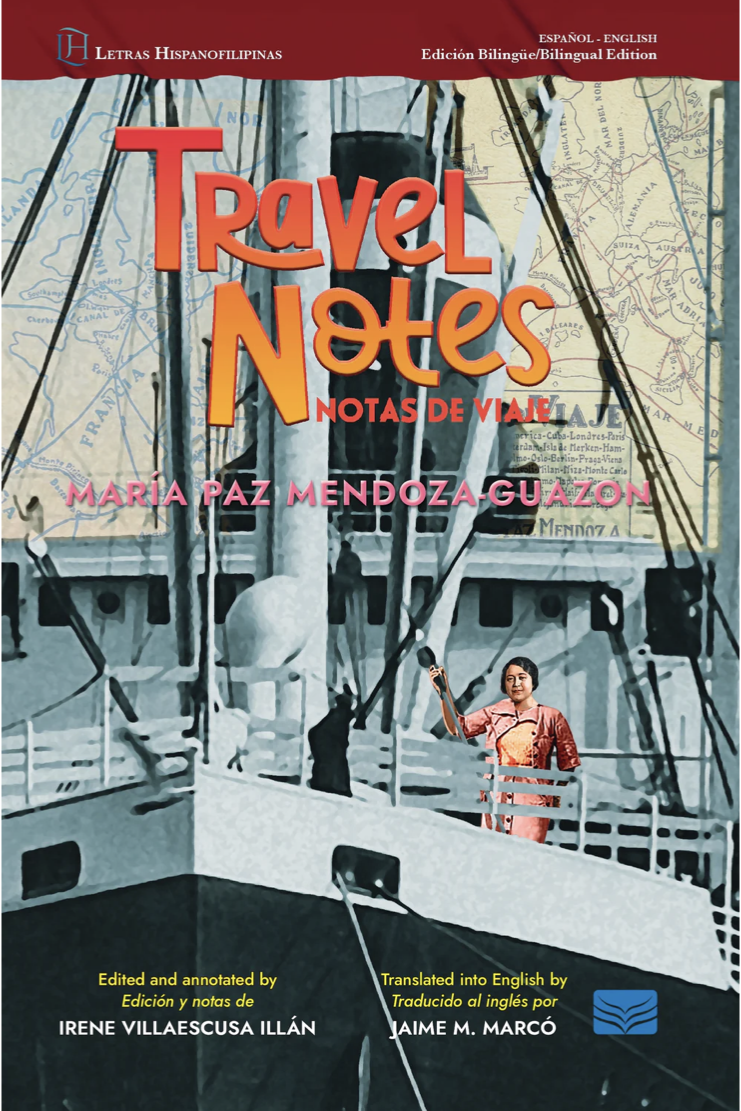
Travel Notes / Notas de viaje By María Paz Mendoza-Guazon
Edited by Irene Villaescusa Illan
Translated by Jaime M. Marco
Share on FacebookDetails
Publisher: Vibal Foundation
Dimensions: 6” x 9”
Pages: 552
Publication Year: 2024
ISBN: 978-971-97-0890-2
Language: Bilingual (Spanish / English)
Description
In Travel Notes (Notas de viaje), author María Paz Mendoza-Guazon chronicles her travels through America, Europe, and the Middle East in the 1930s, with the forward-thinking intelligence of a pioneer Filipina physician.
Along with vivid descriptions of the sights and experiences of her journey, Mendoza’s notes contain the historical and cultural context of each destination, along with her frank comparisons with the Philippines of that time. Through her observations on how Filipinos back home might benefit from some of the practices in these countries, the author expands horizons for readers who would have had little access to such knowledge. These travel notes present an insightful traveler’s view, at a delicate time when the Philippines was asserting its identity in the larger world while continuing to struggle for independence from American rule.
In an information-driven age when travel writing has evolved to suit changing technologies and cultural realities, Travel Notes serves as both a snapshot of a particular historical era as well as a timeless masterwork of travel writing as an art form.
Mendoza-Guazon was a woman of many firsts, blazing many trails as the first female graduate of the University of the Philippines College of Medicine, a pioneer suffragist and feminist, and the first female writer to be honored with the prestigious Premio Zóbel for this very work first published in 1930.
Spanish text:
En Notas de viaje, la escritora filipina María Paz Mendoza-Guazon relata sus viajes por América, Europa y Oriente Próximo en la década de los 30, con la inteligencia de una médica pionera.
Junto a las descripciones vívidas de los paisajes y de sus experiencias, las notas de Mendoza describen el contexto histórico y cultural de cada destino, añadiendo comparaciones sinceras con las Filipinas de la época. Con sus observaciones acerca del modo en que los filipinos podrían beneficiarse de algunas de las prácticas de estos países, la autora intenta ampliar el horizonte de compatriotas que habrían tenido difícil acceso a tales conocimientos. Estas notas de viaje nos acercan a la perspicaz visión de una viajera en una época en la que Filipinas estaba afirmando su identidad en el resto del mundo, al mismo tiempo que seguía luchando por deshacerse del dominio estadounidense.
En una era impulsada por la información en la que la crónica de viajes había evolucionado para adaptarse a las cambiantes tecnologías y realidades culturales, Notas de viaje constituye, al mismo tiempo, la foto fija de una época histórica y una obra maestra perenne de la crónica de viajes como forma de arte.
Mendoza-Guazon fue una mujer de gran talento, y pionera en muchos ámbitos: como primera mujer licenciada en la Facultad de Medicina de la Universidad de Filipinas, como sufragista y feminista pionera, y como primera escritora galardonada con el prestigioso Premio Zóbel por esta misma obra, publicada por primera vez en 1930.
REVIEWS
This bilingual edition in English and Spanish features an engaging introduction by Irene Villaescusa Illán that provides a warm and accessible context, situating Mendoza-Guazon’s travel narratives within the broader scope of Hispano-Filipino literature, Spanish-language literature, and the rich tradition of feminist travel writing by Spanish and Latin American women in the early twentieth century…. It not only brings Mendoza-Guazon’s remarkable experiences to a new audience but also highlights her significant contributions to literature and social reform. Notas de viaje is more than a travel diary; it is a testament to the enduring spirit of a woman dedicated to progress and change.
—Rocío Ortuño Casanova
Professor of Literature, UNED
Notas de viaje añade la perspectiva femenina a otras narraciones de viajes de hombres filipinos, esta vez subrayando la importancia del movimiento sufragista y la educación de las mujeres, convirtiéndose así en una referencia para el movimiento feminista en Filipinas. Como sugiere Irene Villaescusa Illán en su introducción, al tiempo que elucubra sobre el colonialismo europeo y el avance de la modernidad y el fascismo en Europa, el discurso de Mendoza-Guazon llega a ser profético en ocasiones. También hay comentarios contradictorios que revelan no sólo su eurocentrismo, sino también su admiración por el fascismo, al que concibe como potencialmente beneficioso para su país.
—Ignacio López Calvo
Catedrático de Literatura y
Cultura Latinoamericanas,
Universidad de California Merced